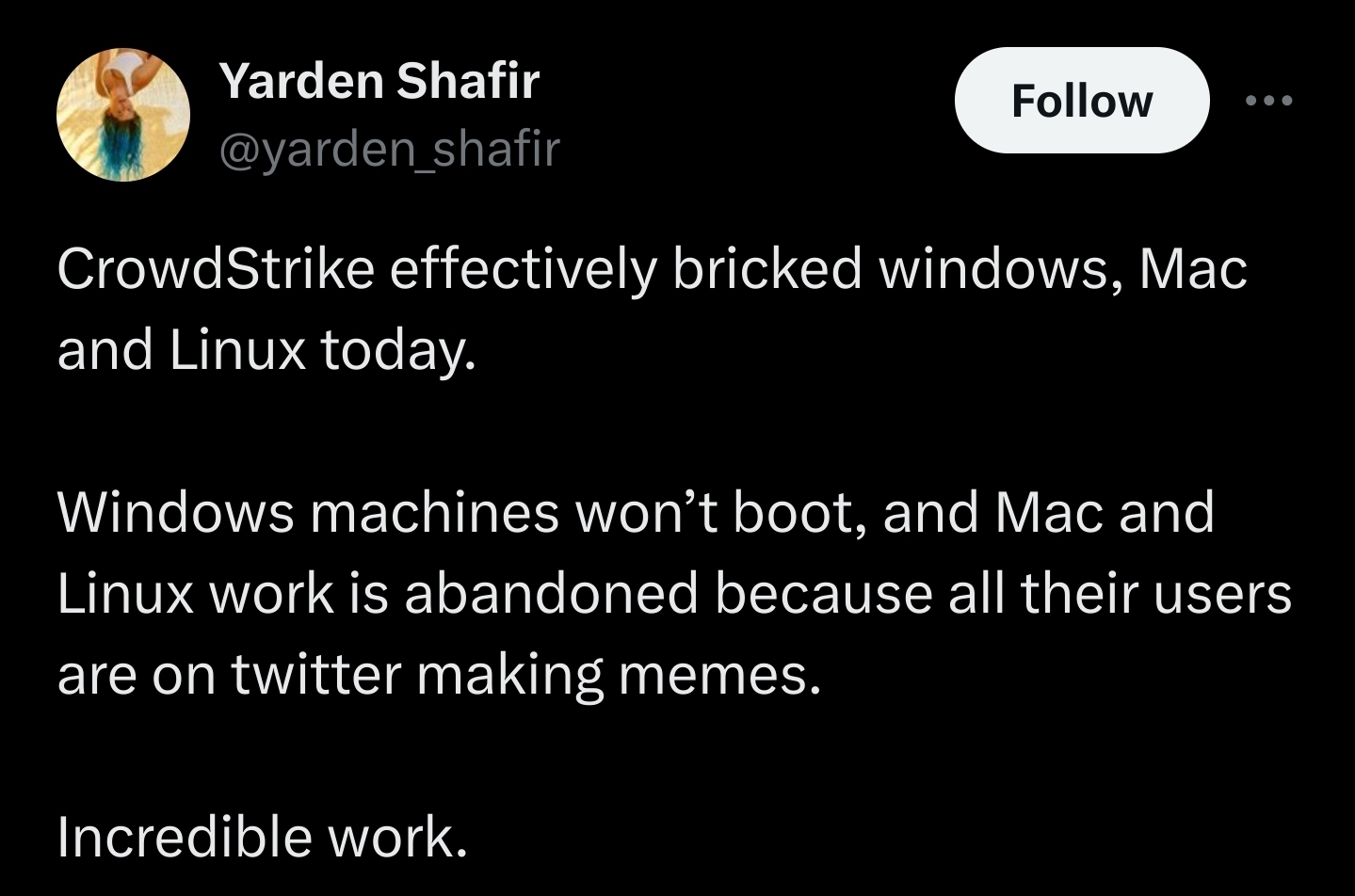2035
you are viewing a single comment's thread
view the rest of the comments
view the rest of the comments
this post was submitted on 19 Jul 2024
2035 points (99.1% liked)
linuxmemes
29333 readers
63 users here now
Hint: :q!
Sister communities:
Community rules (click to expand)
1. Follow the site-wide rules
- Instance-wide TOS: https://legal.lemmy.world/tos/
- Lemmy code of conduct: https://join-lemmy.org/docs/code_of_conduct.html
2. Be civil
- Understand the difference between a joke and an insult.
- Do not harrass or attack users for any reason. This includes using blanket terms, like "every user of thing".
- Don't get baited into back-and-forth insults. We are not animals.
- Leave remarks of "peasantry" to the PCMR community. If you dislike an OS/service/application, attack the thing you dislike, not the individuals who use it. Some people may not have a choice.
- Bigotry will not be tolerated.
3. Post Linux-related content
- Including Unix and BSD.
- Non-Linux content is acceptable as long as it makes a reference to Linux. For example, the poorly made mockery of
sudoin Windows. - No porn, no politics, no trolling or ragebaiting.
- Don't come looking for advice, this is not the right community.
4. No recent reposts
- Everybody uses Arch btw, can't quit Vim, <loves/tolerates/hates> systemd, and wants to interject for a moment. You can stop now.
5. 🇬🇧 Language/язык/Sprache
- This is primarily an English-speaking community. 🇬🇧🇦🇺🇺🇸
- Comments written in other languages are allowed.
- The substance of a post should be comprehensible for people who only speak English.
- Titles and post bodies written in other languages will be allowed, but only as long as the above rule is observed.
6. (NEW!) Regarding public figures
We all have our opinions, and certain public figures can be divisive. Keep in mind that this is a community for memes and light-hearted fun, not for airing grievances or leveling accusations. - Keep discussions polite and free of disparagement.
- We are never in possession of all of the facts. Defamatory comments will not be tolerated.
- Discussions that get too heated will be locked and offending comments removed.
Please report posts and comments that break these rules!
Important: never execute code or follow advice that you don't understand or can't verify, especially here. The word of the day is credibility. This is a meme community -- even the most helpful comments might just be shitposts that can damage your system. Be aware, be smart, don't remove France.
founded 2 years ago
MODERATORS

Always has been. I've clean Symantec A/V off way too many systems in my time, post BSOD. That crap came pre-loaded on so many systems, and then borked them. The problem is, that in order to actually protect system from malware, the A/V has to have full, kernel level access. So, when it goes sideways, it usually takes the system down. I've seen BSODs caused by just about every vendor's A/V or EDR product. Shit happens. Everyone makes mistakes, but when that mistake is in A/V or EDR, it usually means a BSOD.
It's tough. The Internet and access to networks provides some pretty good advantages to users. But, it also means users making mistakes and executing malware. And much of the malware now is targeted at user level access; so, you can't even prevent malware by denying local admin/root. Ransomware and infostealers don't need it. A/V ends up being a bit of a backstop to some of that. Sure, it mostly is a waste of resources and can break stuff when things go bad. But, it can also catch ransomware or alert network defenders to infostealers. And either of those can result in a really, really bad day. A ransomed network is a nightmare. And credentials being stolen and not known about can lead to all kinds of bad stuff. If A/V catches or alerts you to just one or two of those events and lets you take action early, it may pay for itself (even with this sort of FUBAR situation) several times over.
Fair. Thanks for that counterpoint.